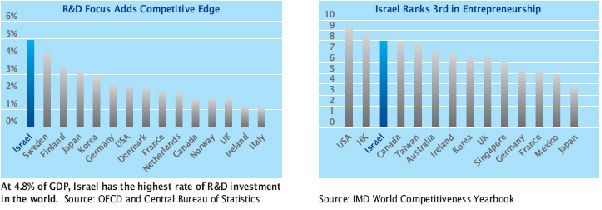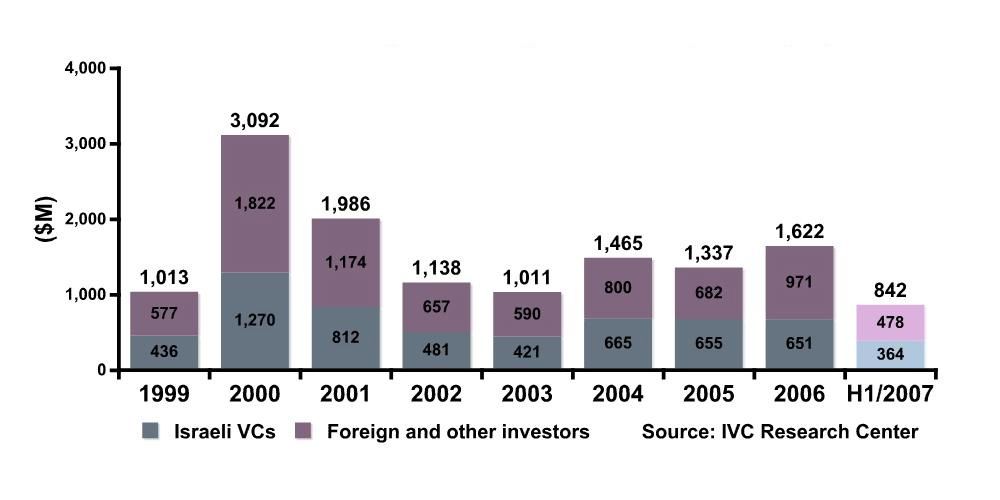Paru dans REGARDS - FÉVRIER 2008.
Accepté auprès des trente pays de l’OCDE, Israël y a mérité sa place grâce à une restructuration financière qui a résulté en une économie croissante, une monnaie forte, une inflation quasi inexistante, le chômage à 7%, … Les technologies développées dans nombre de domaines ont positionné un pays leader incontournable.

Dans le cadre du 60e anniversaire d’Israël,
nous poursuivons la publication d’articles
portant sur la modernité du jeune Etat.
Ce mois-ci, nous avons invité Charlotte
Gutman-Fischgrund, spécialiste du secteur
high-tech, à dresser un bilan du dynamisme de
l’industrie israélienne des nouvelles technologies.
Malgré tous les rebondissements politiques au Moyen Orient, l’économie a repris le dessus après des années menaçantes. Même dans les moments les plus difficiles, « business as usual » était d’application et jamais aucune société n’aura fait percevoir une angoisse quelconque.
Stanley Fischer, le gouverneur de la Banque Nationale en Israël félicite les Israéliens pour leur performance en 2006, résultat inédit qui a permis l’acceptation à l’OCDE où Israël était déjà observateur dans divers domaines. De plus, la signature de l’accord bilatéral avec l’UE en a fait un partenaire commercial européen impliqué désormais au-delà du 7èmeprogramme cadre en R&D dans lequel Israël a investi $1 milliard.
L’eau et les nouvelles énergies
Les Israéliens ingénieurs et ingénieux recherchent aussi des solutions pour le mieux vivre de l’humanité.
L’année 2007 a confirmé la position d’Israël comme la Silicon Valley des technologies de l’eau. La conférence WATEC 2007 a attiré plus de 2.000 visiteurs et 100 délégations commerciales du monde entier. Près de 550 sociétés y ont exposé leur technologie dans des domaines divers tels que : les systèmes d’irrigation avancés, la désalinisation, la purification des eaux usées, la gestion de l’eau et le contrôle du flux, la qualité et le traitement de l’eau, etc. Israël recycle 75% des eaux usées, ce qui correspond au plus haut pourcentage à ce jour.
« En 1994, la paix sur l’eau est signée avec l’aide des négociateurs des Nations Unies et des USA. La Jordanie donne l’eau en hiver et Israël donne l’eau en été. Par cette coopération mutuelle, ces deux pays ont cimenté la paix entre eux. Sur le plan politique, ce traité a rapproché des ennemis du passé. » a affirmé Booky Oren, Président de WATEC 2007.
Shimon Peres, lors de la session de clôture de la conférence WATEC 2007 à Tel Aviv, a précisé « que les technologies de l’eau et du soleil vont changer le Moyen Orient en une région verte et propre, et qu’il n’y aura pas de place pour l’égoïsme de monopole ». L’exportation de l’industrie de l’eau devrait augmenter en 2007 de 28%, une croissance sans précédent.
Les raisons du succès du hi-tech israélien
Depuis 2005, les sociétés israéliennes ont pris la 2èmeposition sur le Nasdaq après les Etats-Unis. Quatre raisons peuvent expliquer ce succès : d’abord l’investissement dans le privé de près de 5% du chiffre d’affaires en recherche et développement ; ensuite l’existence du « Chief Scientist Officer » au sein du Ministère de l’Industrie et du Commerce responsable de juger plus de 2.000 business plans par an dont la moitié est soutenue financièrement. Enfin, la plupart des sociétés de technologie israélienne ont pour but de vendre leurs produits au niveau international dès le départ. Last but not least, la plupart des technologies développées avec succès dans le civil trouvent leur origine dans le militaire.
Voici quelques exemples impressionnants :
Télécoms : ECI fondée en 1961, emploie 3.000 personnes, pour des profits nets de $43 millions en 2006. ECI fut choisie par Beijing Poweret Beijing Subway pour actualiser leur réseau de communication en vue des Jeux Olympiques 2008.
Communication : Telrad a été primée par Nortel comme le fournisseur le plus innovant en 2007, Tadiran Communications existe depuis plus de 40 ans et est leader mondial dans la communication militaire.
Internet : Plus de 200 sociétés sont actives dans les applications et l’infrastructure.
Microprocesseurs : Intel, leader mondial a choisi Israël en 1974 pour implanter son premier centre R&D en dehors des Etats-Unis. C’est en Israël que furent développés plusieurs microprocesseurs dont le « PentiumMMX » en 1995.
Logiciel : Amdocs créée en 1982 est devenu leader mondial dans divers domaines de la téléphonie, 16.000 employés, CA $2.84 milliards en 2007. Son concurrent direct, également israélien d’origine, est Comverse, récompensé par le magazine américain ‘Internet Telephony’ en 2007.
Imprimerie : Bordeaux Digital PrintInk, pionnier des encres digitales et écologiques.
Arts graphiques : EFI, leader mondial dans les technologies de l’imprimerie, fut créée par Efi Arazi, le fondateur de Scitex en 1989.
Aéronautique : Israel Aircraft Industries, un des leaders en technologies aérospatiales, a développé le drône, l’avion sans pilote.
Biotechnologie :Nombreuses sont les nouvelles sociétés qui doivent passer par les tests cliniques pour être approuvés. Pluristem a réussi à produire des cellules qui vont révolutionner la greffe de moelle osseuse.
Médical : Israël est réputé pour la production d’équipements aidant au diagnostic. Given Imaging est reconnu pour sa caméra en forme de cachet à avaler et qui photographie l’intestin de l’intérieur.
Pharmaceutique : TEVA, leader mondial de médicaments génériques, compte 26.000 employés pour un CA $8.4 milliards en 2006. Le titre a gagné 4.000% depuis 1982.
Agriculture : Netafim est leader mondial dans les systèmes d’irrigation goutte à goutte.
Eau : Mekorot, société d’Etat fut fondée en 1937 et produit 1.4 milliard m³ d’eau par an, assurant 80% des besoins en eau potable du pays.
Mekorot construit actuellement la plus grande usine de désalinisation qui produira 100 million m³ par an.
Energies alternatives : Solel a remporté le plus gros contrat au monde dans le domaine de l’énergie solaire, $4 milliards pour alimenter 400.000 maisons en Californie.
Investissez en Israël
Les fonds d’investissements et les investisseurs privés observent l’ingéniosité israélienne. Les investissements étrangers s’élevaient à $14.2 milliards en 2006 (IVC Research Center).
Israël est passé de la 23èmeà la 15èmeplace dans l’index de compétitivité globale 2006-2007 qui place le pays en première position dans le cadre de la disponibilité de scientifiques et d’ingénieurs, quatrième au niveau de la qualité des institutions de recherche scientifique et d’engagement technologique.
« Par le fait d’être dépourvusde richesses naturelles, nous devons trouver d’autres chemins, je crois que dans les 20 années à venir, nous produirons de l’eau, et trouverons des énergies alternatives. Oublions le conflit et améliorons nos conditions de vie. Israël, petit en taille et grâce aux nombreux scientifiques, pourrait être reconnu comme un laboratoire aux yeux du monde! Nous n’avons pas de passé de coopération avec nos voisins mais un futur économique plus important que le militaire. »a conclu le Président Shimon Peres.m
Amen.
Charlotte Gutman-Fischgrund
Depuis 1984 promeut des sociétés israéliennes hi-tech en Europe





